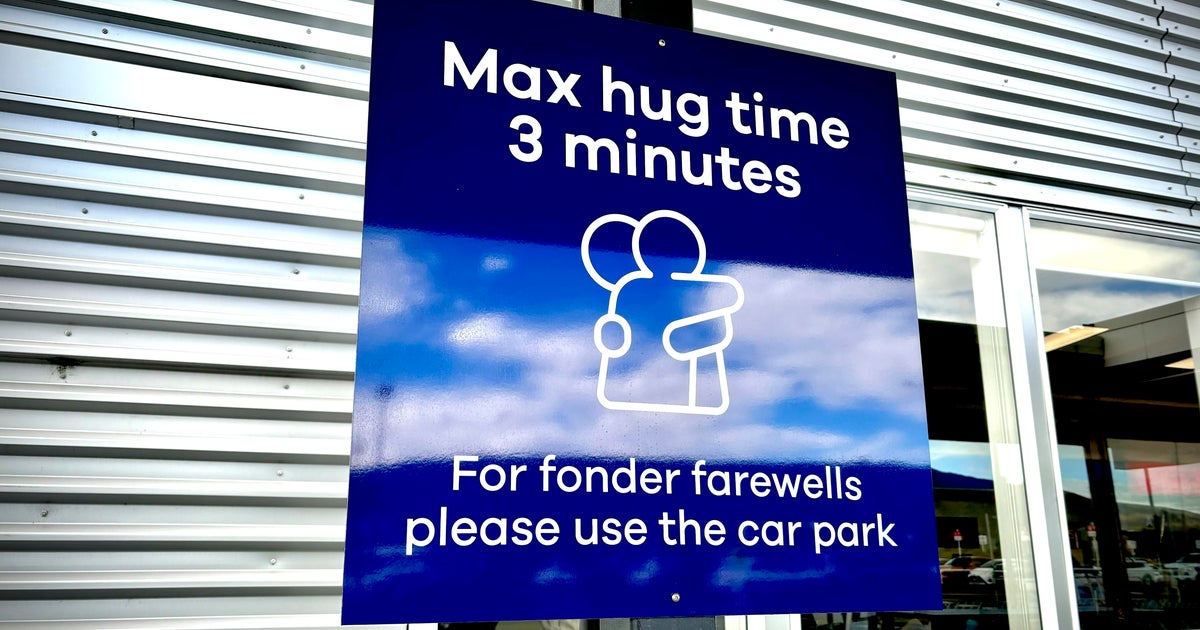CBS News
More than 30 stranded whales rescued in New Zealand by people lifting them on sheets

More than 30 pilot whales that stranded themselves on a beach in New Zealand were safely returned to the ocean after conservation workers and residents helped to refloat them by lifting them on sheets. Four of the pilot whales died, New Zealand’s conservation agency said.
New Zealand is a whale stranding hotspot and pilot whales are especially prolific stranders.
A team was monitoring Ruakākā Beach near the city of Whangārei in New Zealand’s north on Monday to ensure there were no signs of the whales saved Sunday stranding again, the Department of Conservation told The Associated Press. The agency praised as “incredible” the efforts made by hundreds of people to help save the foundering pod.
“It’s amazing to witness the genuine care and compassion people have shown toward these magnificent animals,” Joel Lauterbach, a Department of Conservation spokesperson, said in a statement. “This response demonstrates the deep connection we all share with our marine environment.”
The agency released images of the rescue effort on social media.
A Māori cultural ceremony for the three adult whales and one calf that died in the stranding took place on Monday. New Zealand’s Indigenous people consider whales a taonga – a sacred treasure – of cultural significance.
New Zealand has recorded more than 5,000 whale strandings since 1840. The largest pilot whale stranding was of an estimated 1,000 whales at the Chatham Islands in 1918, according to the Department of Conservation.
It’s often not clear why strandings happen but the island nation’s geography is believed to be a factor. Both the North and South Islands feature stretches of protruding coastline with shallow, sloping beaches that can confuse species such as pilot whales – which rely on echolocation to navigate.
Mass strandings of pilot whales have happened elsewhere in recent months.
In July, 77 long-finned pilot whales were found washed ashore off the northeast coast of Scotland, 65 of them already dead. The 12 whales that initially survived the mass stranding had to be euthanized.
In April, a mass stranding of long-finned pilot whales in southwestern Australia led to the deaths of 29 of the beached creatures, but about 100 of the whales were rescued and redirected out to sea.
Last year, nearly 100 pilot whales became stranded on a beach in Western Australia, but after a rescue attempt, they all died.
Pilot whales are a large species of dolphin, with individuals usually measuring between 19 and 25 feet in length and weighing between 2,900 and 5,000 pounds, according to the National Oceanic and Atmospheric Administration. A pilot whale’s typical lifespan is anywhere from 35 to 60 years, although their survival is threatened by several factors including chemical contaminants, disease, entanglement in fishing gear and ocean noise. They tend to travel in dense pods, and much of what is known about the species and their behaviors has come out of other mass strandings.
contributed to this report.
CBS News
Chinese trans woman awarded thousands over forced electroshock “conversion therapy” hopes for change

A transgender woman in China who recently won 60,000 yuan (roughly $8,300) in compensation from a hospital that forced her to undergo several rounds of electroshock “conversion therapy” has told CBS News that she hopes her experience will herald change for the LGBTQ+ community in her country.
“I hope that the transgender community will soon have safeguard measures and basic human rights, and will no longer be victimized by medical treatment,” said the 28-year-old performance artist who goes by the pseudonym Ling’er.
Ling’er
Ling’er was admitted to a hospital about a year after coming out to her parents as transgender, she previously told the U.K.’s Guardian newspaper. She said in that interview that her parents were “very opposed” to her gender identity and “felt that I wasn’t mentally stable. So they sent me to a mental hospital.”
In the hospital, Ling’er was diagnosed with an “anxiety disorder and discordant sexual orientation,” she told the Guardian. She said she was held for 97 days and subjected to seven sessions of electroshock treatment.
“It caused serious damage to my body,” Ling’er said. “Every time I underwent the treatment, I would faint… I didn’t agree to it, but I had no choice.”
Ling’er said the electric shocks caused her to develop heart problems, which she now requires medication to treat.
The hospital “tried to ‘correct me’, to make me conform to society’s expectations,” Ling’er told the Guardian.
The hospital declined to comment when approached by the Guardian.
There is a legal ambiguity surrounding so-called conversion therapy for LGBTQ people in China. The government removed homosexuality from an official list of psychiatric disorders in 2001, but a diagnosis for distress about sexual orientation remained on the books until recently.
A 2017 Human Rights Watch report urged the Chinese government to prevent hospitals and other medical facilities from subjecting LGBTQ people to conversion therapies. HRW said many victims of these therapies in China were forcibly brought to hospitals by their families.
“I feel good, I won my case,” Ling’er told CBS News. “I hope that my case will be useful for transgender cases in China.”
CBS News
Retail credit card interest rates hit all-time high

Watch CBS News
Be the first to know
Get browser notifications for breaking news, live events, and exclusive reporting.
CBS News
Menendez Brothers to appear in court in hearing that could bring them closer to release

Watch CBS News
Be the first to know
Get browser notifications for breaking news, live events, and exclusive reporting.








